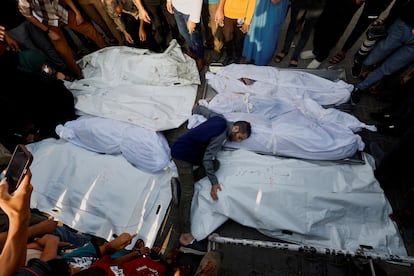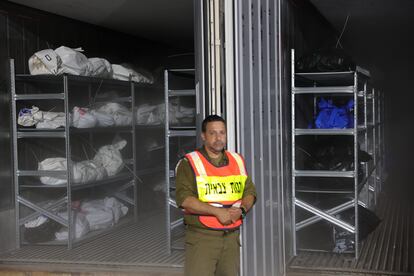They should leave the Holocaust alone
Comparisons with the Shoah, like those made by Benjamin Netanyahu, minimize the horror that the Middle East is experiencing


The Jewish philosopher Leo Strauss coined the idea that when someone draws a comparison to Hitler in an argument, it means they have already lost it. Since the Hamas terrorist attack against Israel and the response with massive bombings against Gaza, comparisons have multiplied. During the visit of French President Emmanuel Macron on Tuesday, Israeli Prime Minister Benjamin Netanyahu declared that “Hamas are the new Nazis.” He also maintained that Israeli children had to “hide in attics like Anne Frank.” Previously, he had compared the crimes of the Palestinian Islamist militia with Babi Yar, the extermination of the Jews of Kyiv by the Nazis, who murdered 33,771 people in a ravine near the Ukrainian capital on September 29 and 30, 1941.
Likewise, there have been numerous comparisons of Israel with the Nazis, in demonstrations, on social media and by world leaders. The president of Colombia, Gustavo Petro, wrote on October 10 on his X (formerly Twitter) account that “Gaza is today as destroyed or even more so as the Warsaw ghetto” and that following “the Jewish and socialist uprising, that concentration camp was destroyed by Nazi barbarism.”
What is happening in the Middle East is so serious, so horrible, the human cost is so horrifying — Gaza authorities maintain that 750 Palestinians have died under bombardment on the Strip in the last 24 hours alone — ; the Hamas barbarity of October 7 demonstrated such a profound dehumanization of its victims, that any comparison with the Holocaust is not only misleading, but seems to minimize the current horror.
The Holocaust is a crime that does not allow comparison, but unfortunately it is not the only genocide that the 20th century or the 21st century have known. In their murderous raid, Hamas militants shot men, women and children, the vast majority of them civilians, murdering people just for being Jewish, just for being born. It is a crime against humanity. Why do we have to bring up the Holocaust?
The Shoah represented the first and only attempt to industrially murder an entire human group, the Jews, and it was the culmination of a project, Nazism, based on racism and crime. Historian and BBC journalist Laurence Rees ended his 2018 book The Holocaust by asking precisely this question: Is the Holocaust a unique event in history? His conclusion was clear. “In recent times I have come to agree with the late Professor David Cesarini who, in a conversation we had a few years ago, put it very eloquently: ‘Never before in history has a leader decided that, in a limited space of time, an ethnic or religious group had to be completely eliminated and that all the necessary equipment to carry out this goal would be created.’ That is unprecedented.”

The Babi Yar massacre, which Netanyahu has cited — the Israeli politician has already manipulated history and the Holocaust on other occasions — is a clear example: for the first time it was not a massive reprisal against civilians, nor a shooting of Jews in the open air as had taken place in Poland and Russia since the beginning of World War II, Nazis wanting to systematically exterminate all the Jews of Kyiv. The death camps, like Auschwitz or Treblinka, were also unique: killing factories equipped with gas chambers.
The Holocaust is a unique crime, but it also represents a lesson in how far human violence against human beings can go when a process of dehumanization is set in motion, when it is considered that the other does not deserve to live just because he or she exists.
Several jurists — including the former president of the Supreme Court of the United Kingdom, Lord Neuberger, and the lawyer and writer Philippe Sands — published a letter in the Financial Times in which they expressed their horror at what that was happening “as Jews, with family and friends directly affected by the tragedy that has befallen Israel.” They considered that Hamas had committed crimes against humanity and war crimes by violating the Geneva conventions and that Israel had the right to defend itself, but they also showed their “significant concern” about the response of the Jewish state — more than 2,300 children have died under bombs since the beginning of the offensive. “In these times of pain and terror, the notion that there are laws that we must all live by is challenging but essential. Jewish history teaches us that we cannot give up on them,” the article ended. The Holocaust is unique and therefore also represents a lesson: the abyss exists, and it has no bottom.
Sign up for our weekly newsletter to get more English-language news coverage from EL PAÍS USA Edition
Tu suscripción se está usando en otro dispositivo
¿Quieres añadir otro usuario a tu suscripción?
Si continúas leyendo en este dispositivo, no se podrá leer en el otro.
FlechaTu suscripción se está usando en otro dispositivo y solo puedes acceder a EL PAÍS desde un dispositivo a la vez.
Si quieres compartir tu cuenta, cambia tu suscripción a la modalidad Premium, así podrás añadir otro usuario. Cada uno accederá con su propia cuenta de email, lo que os permitirá personalizar vuestra experiencia en EL PAÍS.
¿Tienes una suscripción de empresa? Accede aquí para contratar más cuentas.
En el caso de no saber quién está usando tu cuenta, te recomendamos cambiar tu contraseña aquí.
Si decides continuar compartiendo tu cuenta, este mensaje se mostrará en tu dispositivo y en el de la otra persona que está usando tu cuenta de forma indefinida, afectando a tu experiencia de lectura. Puedes consultar aquí los términos y condiciones de la suscripción digital.








































